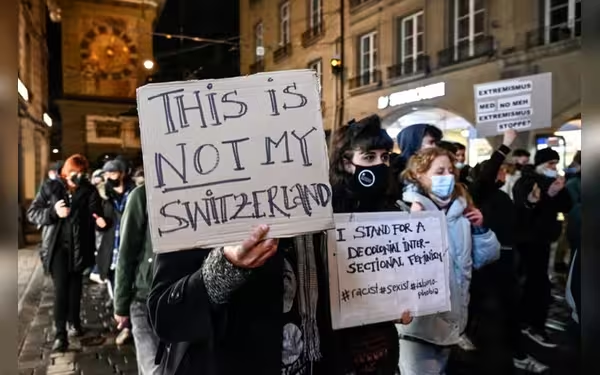Saturday, November 16, 2024 07:46 PM
Switzerland's Burqa Ban Set to Begin in 2025
- Switzerland to enforce facial covering ban from January 2025.
- Critics argue it infringes on religious freedoms.
- Exemptions include health, safety, and artistic expressions.
 Image Credits: arabnewspk
Image Credits: arabnewspkSwitzerland's controversial burqa ban will take effect on January 1, 2025, sparking debates on personal freedoms and public safety.
In a significant move that has sparked widespread debate, Switzerland is set to implement a ban on facial coverings in public spaces, commonly referred to as the "burqa ban." This controversial legislation, which will take effect on January 1, 2025, was narrowly approved in a 2021 referendum. The decision has drawn sharp criticism from various Muslim organizations, who argue that it infringes on personal freedoms and religious rights.
The origins of this ban can be traced back to a group that previously campaigned for a prohibition on the construction of new minarets in 2009. The Swiss Federal Council, the country's governing body, announced the official start date for the ban, emphasizing that individuals who violate this law could face fines of up to 1,000 Swiss francs, equivalent to approximately $1,144.
It is important to note that the ban does not extend to certain areas. For instance, facial coverings will still be allowed on airplanes, in diplomatic and consular premises, and within places of worship or other sacred sites. Additionally, the government has clarified that facial coverings can be worn for health and safety reasons, in accordance with native customs, or due to weather conditions. Artistic expressions and advertising purposes are also exempt from this ban.
Furthermore, if individuals require facial coverings for personal protection while exercising their rights to freedom of expression and assembly, these will be permitted, provided that the responsible authority has granted prior approval and public order is maintained.
This impending legislation raises important questions about the balance between public safety and individual rights. While proponents argue that the ban is necessary for security and social cohesion, opponents contend that it disproportionately targets specific communities and undermines the principles of freedom and tolerance that Switzerland is known for. As the implementation date approaches, it remains to be seen how this law will affect the diverse fabric of Swiss society and whether it will lead to further divisions or foster a more inclusive environment.
The Swiss "burqa ban" is not just a legal issue; it is a reflection of broader societal attitudes towards multiculturalism and religious expression. As countries around the world grapple with similar challenges, the outcome of this ban may serve as a case study for how societies can navigate the complex interplay between cultural identity and public policy.













